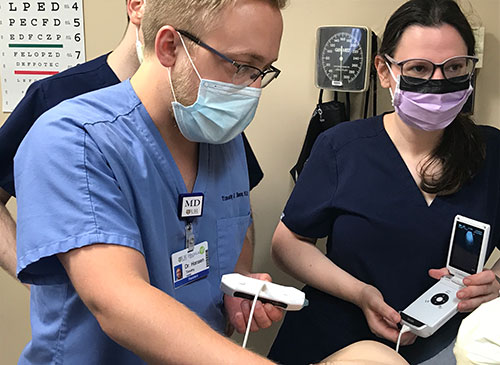Additional Curricular Priorities
 Point-of-Care Ultrasound
Point-of-Care Ultrasound
Diagnostic Point-of-Care Ultrasound (POCUS) training has expanded broadly to include medical students, residents, fellows, and faculty members within our Department of Internal Medicine.
We believe that core POCUS skills are key to our residents’ future careers and therefore provide foundational POCUS training to all of our residents through a variety of experiences.
Integral to our Internal Medicine resident POCUS training is a two-week ultrasound rotation with directly supervised scanning by enthusiastic faculty members. Skills are reinforced over the course of residency through didactics, workshops, a wide array of teaching opportunities, and through direct patient care, with teaching attendings helping to incorporate POCUS findings into clinical decision making on team rounds.
We also offer a longitudinal POCUS rotation spread over the course of the year during ambulatory blocks as well as an ultrasound distinction track that facilitates the development of more advanced skillsets and academic projects.
Resident access to ultrasound machines is facilitated by both cart-based and hand-held ultrasounds on hospital units as well as hand-held machines assigned to teams.
Procedures
A resident-led effort over the past few years greatly expanded procedural opportunities for residents at SMH. This effort ultimately led to the creation of a dedicated procedure service that is staffed with an attending, advanced practice providers, and residents. The service performs large numbers of procedures at the bedside, including paracentesis, thoracentesis, central line placement, lumbar puncture, and ultrasound-guided peripheral IV placement. Residents rotate onto the Procedure Service as PGY2s.
Social Determinants of Health
We have an interactive, experience-based curriculum to help all Internal Medicine residents learn about and advocate for patients with barriers that impact their ability to live to their fullest potential. Every intern in our categorical, primary care, and physician scientist programs will go out into the community to learn about resources available to patients in addition to the services provided within our institution. Upper-level Internal Medicine residents have the opportunity to continue this exploration within the community through our Community Outreach elective. We also offer the Community Health and Advocacy Resident Education (CARE) track, where residents have the opportunity to develop their own community partnerships. Finally, all residents have the opportunity to embed social determinant filters into their ambulatory clinic dashboards, allowing them to explore important health elements (e.g., HbA1C for diabetic patients, BP control for those with hypertension, cancer screening completion, etc.) for their personal panel of patients and/or patients in the whole practice by various identity filters (e.g., gender, SES, race, etc.).
Quality Improvement and Patient Safety
In 2016 the University of Rochester Medical Center (URMC) was selected by the ACGME to be one of 8 institutions nationally to be a CLER (Clinical Learning Environment Review) Innovator site. This has helped URMC become a leader in improving medical centers’ Clinical Learning Environments. From a practical perspective, our residents benefit from multiple ongoing initiatives that improve the care of patients (e.g., improving hand-offs and transitions of care); improve the learning, supervision, and professionalism culture; and integrate residents into the patient safety and quality improvement (QI) initiatives underway throughout the medical center.
All of our residents are taught basic and advanced QI and patient safety knowledge and skills. In addition, senior residents all participate in ongoing multidisciplinary QI teams working on real-world QI projects in areas of their choosing (e.g., ambulatory primary care vs. general medicine inpatient vs. intensive care vs. specialty projects).
Communication Skills
Communicating effectively with patients, their families, and other healthcare team members is absolutely critical to providing the highest quality patient care. A portion of our curriculum is dedicated to communication skills training, including in the ambulatory education sessions (e.g., building relationships, motivational interviewing, shared decision-making, etc.) and in clinical rotations (e.g., running a family meeting in the palliative care rotation). In addition, we are very fortunate to have a PhD psychologist, Dr. Andrea Garroway, who spends the majority of her time working on one-on-one coaching our internal medicine residents in communicating with their patients, families, and teams.